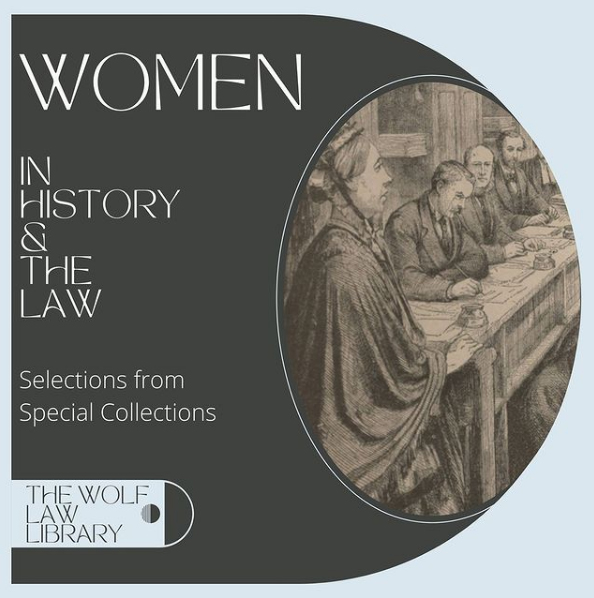Women in History and the Law: Wolf Law Library Exhibit Explores Women’s Lives From 17th to Mid 20th Centuries
Notes from the Curator
The new exhibit currently on display in the Nicholas J. St. George Rare Book Room at the Wolf Law Library, Women in History and the Law, has been on my mind for over two years. The exhibit was to open in the middle of March 2020, but the pandemic had other plans for the world and, of course, the Law School.  Linda Tesar, the library's Head of Technical Services & Special Collections, invited me to create a rare books exhibit and allowed me to pick the subject. She pulled a large archival box from special collections, stating that it could be interesting to exhibit something from the box, because nothing in it had been featured in an exhibit before. In the box I found the two documents now on display in the case with the Marshall-Wythe Mace: a 1771 order to the sheriff of Charlotte County to arrest Sarah Worsham and an 1847 deed of Andrew Constable and Jemima S.W. Constable to James K. Savage for land in Elizabeth City County. These items are remarkable because it can be difficult to find evidence of women’s lives among the material in special collections.
Linda Tesar, the library's Head of Technical Services & Special Collections, invited me to create a rare books exhibit and allowed me to pick the subject. She pulled a large archival box from special collections, stating that it could be interesting to exhibit something from the box, because nothing in it had been featured in an exhibit before. In the box I found the two documents now on display in the case with the Marshall-Wythe Mace: a 1771 order to the sheriff of Charlotte County to arrest Sarah Worsham and an 1847 deed of Andrew Constable and Jemima S.W. Constable to James K. Savage for land in Elizabeth City County. These items are remarkable because it can be difficult to find evidence of women’s lives among the material in special collections.
The exhibit explores how women’s lives changed from the 17th century through the mid 20th century. Several of the books on display discuss the legal doctrines of jointure, dower, and coverture, all of which affected the rights of women to own property. One of the volumes on display includes a report of the case in which Catherine Norton Sinclair Forrest sued her husband, the famous actor Edwin Forrest, for divorce in 1851, resulting in a sensational six-week-long trial.
Other books feature women’s working lives and activism. The law library is fortunate to own and be able to display legal treatises printed by Elizabeth Nutt, Elizabeth Flesher, Elizabeth Lynch, and Sarah Cotter. These women operated print shops in the 17th and 18th centuries and printed law books in their own names.
Interpretation of books in the exhibit required careful thought. While many feature accomplishments of women, they also illustrate long histories of sexism, racism, nationalism, eugenics, and violence. The item that gave me the most pause was The Jewels of Virginia, a speech sponsored by the Hollywood Memorial Association and given in Richmond on of Robert E. Lee’s birthday in 1867. I originally selected the speech for the exhibit to discuss Ladies Memorial Associations, groups of southern white women who formed Confederate cemeteries and bolstered the Lost Cause narrative following the end of the Civil War. However, the Black Lives Matter protests and the removal of Confederate statutes on Monument Avenue in Richmond occurred in the intervening period between my selection and the exhibit opening. I felt it was important to acknowledge the harm that these local groups had inflicted, while also demonstrating their contributions to the cultural and built landscape of Virginia.
Many thanks to Linda Tesar, Devan Orr, and Jake Kmiech for all their help with this exhibit. You can view Women in History and the Law on weekdays from 8 a.m. - 4:45 p.m. now through March 31, 2022.
Joanna Quint is a Cataloging & Acquisitions Specialist at the Wolf Law Library.
About William & Mary Law School
Thomas Jefferson founded William & Mary Law School in 1779 to train leaders for the new nation. Now in its third century, America's oldest law school continues its historic mission of educating citizen lawyers who are prepared both to lead and to serve.